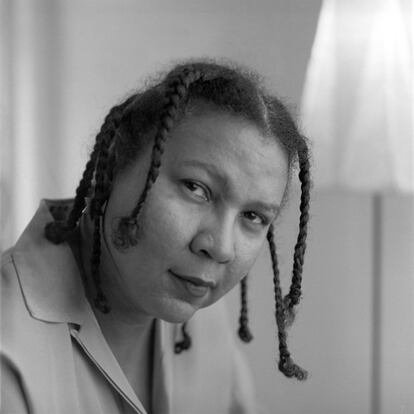bell hooks, the activist who called out racism in the feminist movement
The U.S. intellectual centralized women that had previously been marginalized. Her essay ‘Feminist Theory: From Margin to Center’ is celebrating its 40th anniversary

Feminism began the day the first person raised their voice against the oppression of women. The movement for equal rights, nonetheless, dragged on the recognition that it was largely ignoring Black and working-class women. Amid its second wave, which took place between 1960 and 1990, Gloria Jean Watkins began to vocalize her own misgivings on this point. She wasn’t the first to address the triple oppression experienced by a large part of the population, but she was, alongside Angela Davis, the one who managed to begin a discourse with the disdainful white women who, until that point, had served as the faces of feminism.
She named herself bell hooks in homage to her maternal great-grandmother — a contrary woman who never hesitated to speak her mind — styling it in lower-case letter to keep the focus on her ideas, rather than persona. It was she who paved the way towards a “more inclusive and useful” feminism, writes Mikki Kendall, one of the leading activists of Black thought in the United States and author of Hood Feminism: Notes from the Women That a Movement Forgot, in an email to EL PAÍS.
It was in 1981 that hooks declared feminism was forgetting the most vulnerable women in her groundbreaking book Ain’t I a Woman?, and in 1984, when she shaped a new feminist theory that included women like her. The latter book, Feminist Theory: From Margin to Center, just celebrated its 40th anniversary. The intellectual — who was born amid Jim Crow laws and studied in segregated schools — begins the book speaking of the train tracks that divided her town in two.
“The railroad tracks were a daily reminder of our marginality,” she writes. “Across those tracks were paved streets, stores we could not enter, restaurants we could not eat in, and people we could not look directly in the face.” The book was written in language all could understand, including the telephone operators with whom hooks was working with when she began to write it —after all, academics had never been her thing, she’d say.
Georgina Monge, a political scientist and Spanish feminist who is a hooks expert, believes the U.S. writer was the pioneer of intersectional feminist theory. Intersectionality went unnamed until U.S. lawyer Kimberlé Crenshaw coined the term in 1989, “but hooks was the one who popularized it,” says Monge in a telephone interview. What she’d come to describe, continues Monge, is that there are multiple factors that create concrete inequalities, and that we are all impacted by our position in relationship to them. Nowadays, this is taken as a given. Back then, less so.
The daughter of a janitor who didn’t like backtalk and a housewife, hooks grew up in a patriarchal but loving home in a rural Kentucky community, deep in the heart of the American South. Raised with five siblings, she was a voracious reader in addition to a budding poet, and saw liberatory potential in her attending university.
Thanks to a scholarship, she studied literature at Stanford, where her discomfort with Betty Friedan’s Feminine Mystique first arose, driving her to pen Ain’t I a Woman? Friedan, the daughter of Jewish immigrants who was trained as a psychologist, spoke in her book of the sexual discrimination of which housewives are victim, and saw work as a pathway to freedom for women. hooks replied that there was life beyond the privileged homes of the Western middle class, and that for women in her community, work could amount to slavery.
She was 19 when she began work on the book and 29 when it was published, after many rejection letters. Its title comes from the famous 1851 speech of Sojourner Truth, abolitionist leader and the first Black woman to win a court case against a white man (which reunited her with her son, who had been sold years before, just like his mother). hooks dedicates a chapter in the book to the horrific lived experiences of slaves. With it, she shows how academics have ignored the impacts of sexist and racist oppression on the lives of enslaved women.
“This disinterest and unconcern leads them to deliberately downplay their experience. [...] It is clear that they intensified and magnified their suffering,” writes hooks. The book, Kendall says, forced feminism to reckon not only with its internal racism, but also to look squarely at “its complicity (through silence, opportunism and erasure) in the oppression of marginalized women.”
hooks was prolific, making dozens of public appearances during which she spoke with her characteristic melodic voice. She wrote close to 40 books. When something unsettled her, she wrote about it. Her great-grandmother’s contrary nature was used for good in titles like Talking Back, the transformative power of education explored in Teaching to Trangress, male feminists were invoked in The Will to Change, the latter insisting on the feminist movement’s need for men to play a role.
She also approached the (great) subject of love with All About Love, in which she defends the revolutionary power of feelings in the care and concern for others, which transcends, she writes, romantic love. She even ventured into Buddhism — hooks identified as a Christian Buddhist — and wrote children’s stories in which she spoke of the beauty of Black hair.
hooks’ books were not published in Spanish until 2017, when the editorial Traficantes de Sueños released El feminismo es para todo el mundo (a translation of Feminism is for Everybody), perhaps proof of Spain’s lag in addressing its own racial problems. “All of us still reproduce racist and classist behavior,” says Beatriz García, from Traficantes de Sueños, when asked why she chose to adapt this particular hooks project. “And we can change the situation by the way we act in our everyday lives.”
In 2004, at 52 years of age, hooks decided to leave her cosmopolitan life and return to Kentucky. She settled three and a half hours from the town where she grew up, in Berea, a small community of 15,000 inhabitants, and taught classes at Berea College, the first integrated private university in the South. “I grew up in the hills of Kentucky,” she said. “I wanted these students to see you can be a cosmopolitan person of the world but still be connected positively to your home roots.”
When hooks died prematurely from kidney failure in 2021, Judy Pryor-Ramirez, Clinical Associate Professor of Public Service at New York University’s Wagner School, wrote a beautiful text about her life. In it, Pryor-Ramirez — who has organized roundtables on hooks’ theories— recalls the healing power of those talks, in which attendees shared reflections and made suggestions on how to continue improving feminism.
She also remembered the walks she took arm-in-arm with hooks through Manhattan, often en route to a meeting or event in which the writer was taking part. Pryor-Ramirez invokes a phrase that was on occasion uttered by hooks — who often spoke in the third person when referring to herself — in reference to people who’d done their work catching up on her considerable body of critical thought, saying that they had “read their bell hooks.”
Sign up for our weekly newsletter to get more English-language news coverage from EL PAÍS USA Edition
Tu suscripción se está usando en otro dispositivo
¿Quieres añadir otro usuario a tu suscripción?
Si continúas leyendo en este dispositivo, no se podrá leer en el otro.
FlechaTu suscripción se está usando en otro dispositivo y solo puedes acceder a EL PAÍS desde un dispositivo a la vez.
Si quieres compartir tu cuenta, cambia tu suscripción a la modalidad Premium, así podrás añadir otro usuario. Cada uno accederá con su propia cuenta de email, lo que os permitirá personalizar vuestra experiencia en EL PAÍS.
¿Tienes una suscripción de empresa? Accede aquí para contratar más cuentas.
En el caso de no saber quién está usando tu cuenta, te recomendamos cambiar tu contraseña aquí.
Si decides continuar compartiendo tu cuenta, este mensaje se mostrará en tu dispositivo y en el de la otra persona que está usando tu cuenta de forma indefinida, afectando a tu experiencia de lectura. Puedes consultar aquí los términos y condiciones de la suscripción digital.









































